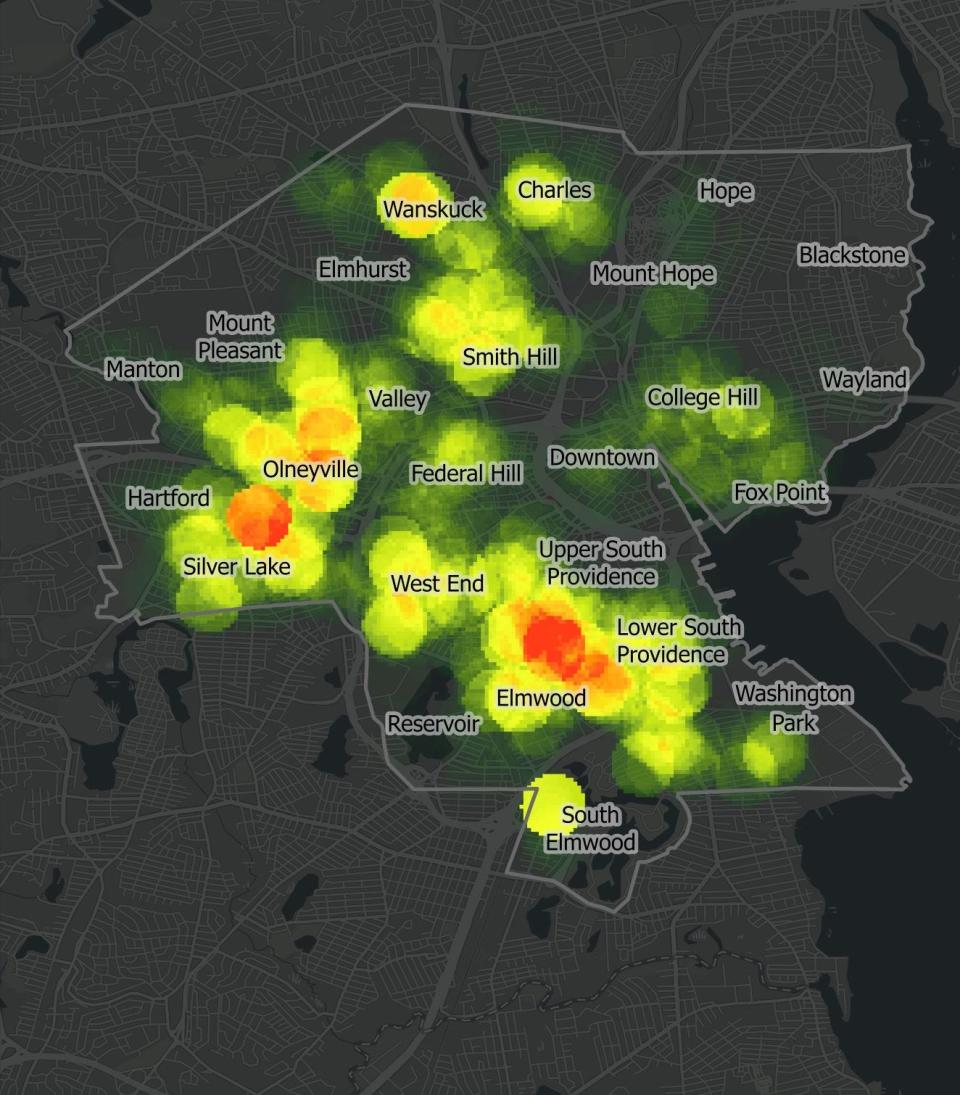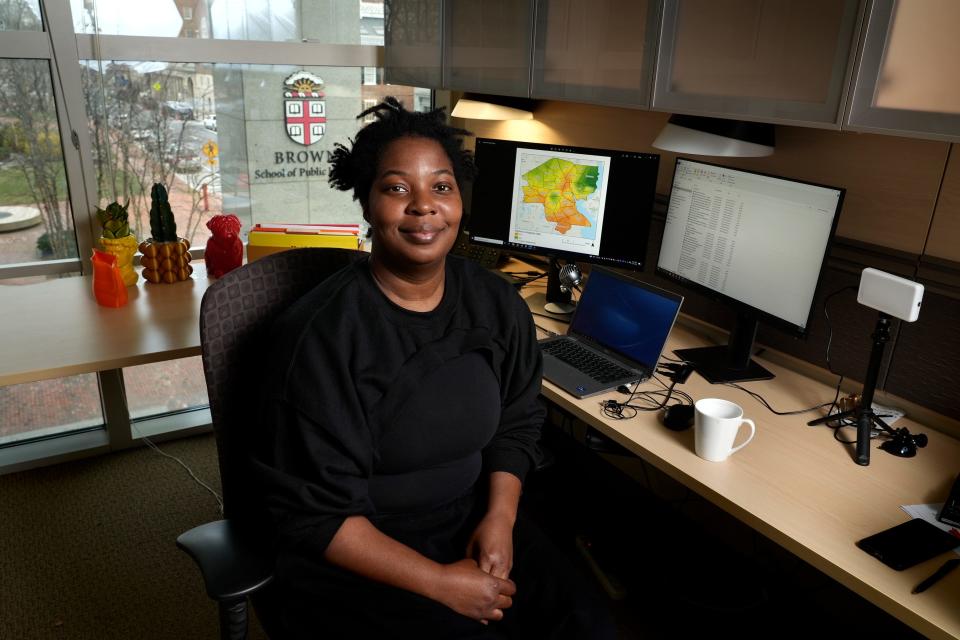Here are the noisiest parts of Providence, based on 5,000 noise complaints called to police
Providence likes to party, at least according to data on noise complaints. In 2022, locals called police about 5,500 times because of noise in their neighborhoods. That's one call every 95 minutes, and at least 15 calls a day.
The reason? Raucous gatherings and blaring music. Calls were concentrated in the South Side, curving up through the West End, Silver Lake, Olneyville and Wanskuck in a sort of messy "C" shape. Notably absent: the East Side, save for some calls around College Hill.
In only 19 cases did police officers generate reports indicating that violations were issued. That means most of the time, those who allegedly broke the noise ordinances didn't receive more than a talking to.

The data, obtained via a public records request, tracks with what Brown University students have been researching with Erica Walker, assistant professor of epidemiology in the School of Public Health. Data they've gathered with sound-level meters shows the southern chunk of the city is polluted by noise, while the eastern part is virtually nuisance-free – at least most of the time.
A Providence Journal analysis of the data on police calls shows that the most common months for noise complaints were May, June and July. The most common times of day were the overnight hours, from around 2 to 5 a.m.
How does noise affect people's physical and mental health?
While Walker knows that highway traffic and trains chugging down railways are major contributors to noise pollution, she said a loud house party can be just as significant in its impact on physical health and peace of mind.
"For me, when I think about noise complaints, I think about an individual at their wits' end," Walker said. "And this was one of the last resorts. And when you think about what it means to be at your wits' end, it means that you're stressed. And when you think about what it means to be stressed, it means that your body is actively trying to fight off something that it deems to be a threat."

That means your heart rate is rising along with your blood pressure and your risks of diminished cardiac health.
"Your body is releasing all of these stress hormones to prepare your body to either fight off the target or flee away from a target," Walker explained.
Noise is already understood by experts – including Walker – as a public health hazard. In 2021, the American Public Health Association estimated that noise places 145 million Americans at risk of high blood pressure. Do a Google search on noise and public health, and you'll find oodles of articles and research papers on the matter. This summer, The New York Times boldly warned, "Noise Could Take Years Off Your Life."
So, is anything being done about it?
In 2022, the city rarely issued violations to loud residents
The Providence Police Department said that typically, when a call about loud music is made, police head over to the house and ask the resident to turn it down. But unless there are multiple complaints about a single address, fines usually aren't issued.
Exact home addresses of alleged nuisances are not included in the data, but certain blocks come up dozens of times as the subject of complaints:
0 Block Bodell Avenue: 119 calls
1000 Block Elmwood Avenue (near Roger Williams Park): 91 calls
0 Block Mitchell Street: 60 calls
800 Block Douglass Avenue: 51 calls
0 Block Shiloh Street: 50 calls
Do higher education institutions enforce noise laws around campus?
Providence College said it only received five calls last year from residents complaining about noise. But that low number comes with some context.
"Those numbers have dropped considerably from where they were 15 or so years ago," said college spokesman Steven Maurano in an email. "The primary reason is that the Eaton St. area from Douglas Ave. to Huxley Ave., and the side streets off Eaton St. are now almost entirely a student neighborhood. Students are less likely to complain about music or noise coming from other student houses than when permanent residents were intermingled with student housing as they were years ago."
More: Noisy neighborhoods can be hazardous to Rhode Islanders' health. How it's being addressed.
According to Maurano, because of the college's history, sometimes residents assume that Providence College students are making a ruckus when, in reality, the noise is being caused by students from other nearby institutions.
Brown University did not provide the number of noise complaints it has received, but said it is trying to boost its on-campus housing to alleviate pressure on the neighborhood.
"For all students who move off campus, our Residential Life team engages in proactive education with students about their responsibilities in local neighborhoods – helping students to understand noise [ordinances] and expectations, for example," university spokesman Brian Clark said in an email. "Students who receive permission to live off-campus are required to abide by Brown’s Code of Student Conduct."
Both schools have protocols for enforcing noise ordinances. Providence College typically defers to Providence police, as their campus safety officers do not have jurisdiction off campus. Similarly, Brown recognizes that off-campus areas are not under its jurisdiction, though campus police join Providence police in responding to complaints involving students. The Rhode Island School of Design, which said it got a "few" complaints last spring, sometimes does the same.
More: Providence received hundreds of noise complaints. But who's listening?
Could noise get more scrutiny from the city?
Providence Mayor Brett Smiley has already factored into the city's budget new decibel readers for police so that the existing laws can be better enforced. On Tuesday, he went a step further when unveiling new payment in lieu of taxes – or PILOT – agreements with four schools: Brown, Providence College, Johnson & Wales University and the Rhode Island School of Design. Those schools, under a new agreement, will need to attend six "quality of life" meetings per year with the city to discuss how their presence – and that of their students – may be affecting the lives of locals. That could include noise.
Smiley said his vision is "solving problems before they become big problems, and to keep peace in the neighborhoods with the residents who, like myself, live very close to a college."
This article originally appeared on The Providence Journal: What are the noisiest neighborhoods in Providence? Look at the noise complaints.

